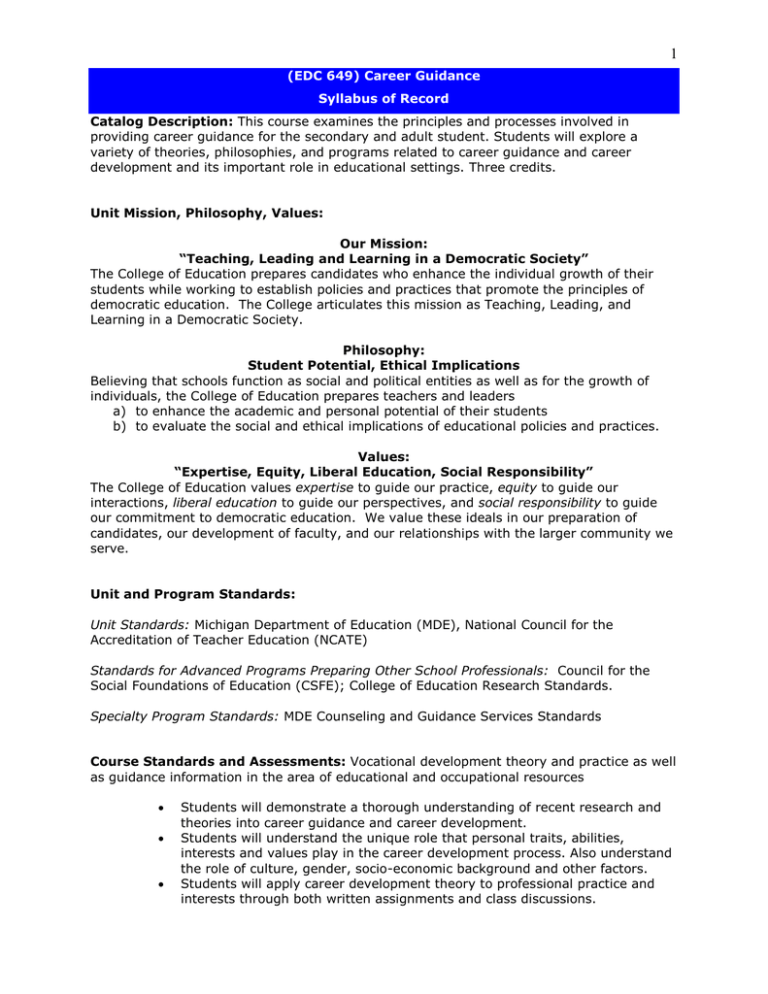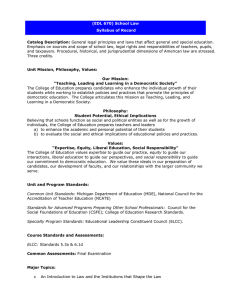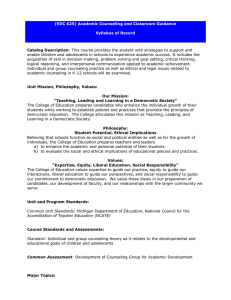1
advertisement

1 (EDC 649) Career Guidance Syllabus of Record Catalog Description: This course examines the principles and processes involved in providing career guidance for the secondary and adult student. Students will explore a variety of theories, philosophies, and programs related to career guidance and career development and its important role in educational settings. Three credits. Unit Mission, Philosophy, Values: Our Mission: “Teaching, Leading and Learning in a Democratic Society” The College of Education prepares candidates who enhance the individual growth of their students while working to establish policies and practices that promote the principles of democratic education. The College articulates this mission as Teaching, Leading, and Learning in a Democratic Society. Philosophy: Student Potential, Ethical Implications Believing that schools function as social and political entities as well as for the growth of individuals, the College of Education prepares teachers and leaders a) to enhance the academic and personal potential of their students b) to evaluate the social and ethical implications of educational policies and practices. Values: “Expertise, Equity, Liberal Education, Social Responsibility” The College of Education values expertise to guide our practice, equity to guide our interactions, liberal education to guide our perspectives, and social responsibility to guide our commitment to democratic education. We value these ideals in our preparation of candidates, our development of faculty, and our relationships with the larger community we serve. Unit and Program Standards: Unit Standards: Michigan Department of Education (MDE), National Council for the Accreditation of Teacher Education (NCATE) Standards for Advanced Programs Preparing Other School Professionals: Council for the Social Foundations of Education (CSFE); College of Education Research Standards. Specialty Program Standards: MDE Counseling and Guidance Services Standards Course Standards and Assessments: Vocational development theory and practice as well as guidance information in the area of educational and occupational resources Students will demonstrate a thorough understanding of recent research and theories into career guidance and career development. Students will understand the unique role that personal traits, abilities, interests and values play in the career development process. Also understand the role of culture, gender, socio-economic background and other factors. Students will apply career development theory to professional practice and interests through both written assignments and class discussions. 1 Students will effectively participate in class discussion sessions centered on the presentation of research for this class. Students will apply information and insights gained from readings and class discussions to practical situations involving secondary and post-secondary students. Common Course Assessment: Career Theory to Practice Paper Major Topics: Introduction to career counseling Introduction to career development Sociological and cultural perspectives Gender & sexual orientation issues Disabled and adult students Career Counseling process Opening Phase & gathering information Career Assessment Interpreting client information Career Planning Course Knowledge Base: Michigan Curriculum Framework (1996) K-12 Program Standards of Quality (1991) Michigan Board of Education Policy and Position Paper on Comprehensive Guidance and Counseling Programs (1987) National Career Development Guidelines (1989) Safe and Drug Free Schools American School Counselors Association National Guidance and Counseling Standards (1999) School-to-Work Legislation and the Michigan’s Career Pathways Program Michigan Comprehensive Guidance and Counseling Program (2005)

